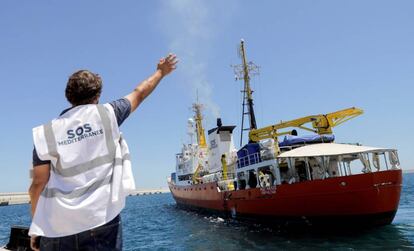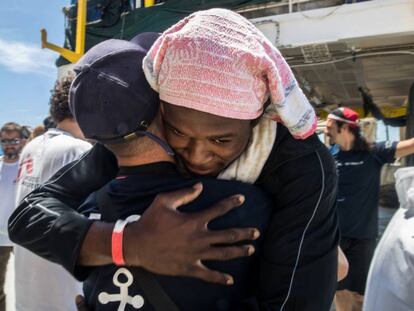After delivering migrants to Valencia, the ¡®Aquarius¡¯ returns to Libyan coast
The NGOs running the rescue ship warn that another such journey would be unfeasible, as the debate in Europe over how to deal with the situation rages on


After bringing 630 migrants to safety in Valencia, the rescue ship Aquarius set sail again on Wednesday, headed for international waters near Libya. The ship, run by the not-for-profits SOS Mediterran¨¦e and Doctors Without Borders (MSF), was the first NGO vessel to run rescue missions after the recent change of government in Italy. Two days later, on June 10, it became the first victim of the country¡¯s new xenophobic policy to close its ports to migrants. The Spanish government responded to the crisis by offering the ship a safe harbor ¨C an exceptional solution to an exceptional case.
The Spanish humanitarian ship Proactiva Open Arms also set sail on Wednesday.
59% of Italian voters support the decision to close country¡¯s ports to NGO ships
Before heading off, the rescue coordinator on the Aquarius, Nicola Stalla, said at the dock that ¡°the mission of SOS Mediterran¨¦e is to stay at sea while there is a need.¡± She reiterated her call to ¡°competent authorities to comply with their obligations and guarantee a safe port that should be the closest to the rescue zone,¡± after the ship was ¡°forced to make the odyssey to Spain.¡± Stalla added that the team does not intend to repeat the long and difficult journey to Valencia. ¡°It is clearly not our plan. Valencia is very far. We have all seen that this is something that should not be repeated.¡±
Small overcrowded boats continue to leave from Libya for Europe, with hundreds of migrants rescued in recent days, some by NGO ships. These migrants have been transferred to Italian military ships and taken to ports in Sicily, albeit with notable delay. According to experts consulted by EL PA?S, the central Mediterranean Sea continues to be the most popular route to Europe, although the path via Spain is close on its heels.
The Italian government¡¯s refusal to accept the Aquarius and the inaction of nearby Malta have sparked a political, diplomatic and legal debate on how to address the dangerous sea crossings by migrants into Europe. Spanish Prime Minister Pedro S¨¢nchez quickly resolved the problem of the 630 migrants on board the Aquarius. But there is uncertainty about what will happen next time.
Border-control expert Paolo Cuttitta from Vrije Universiteit Amsterdam argues that ¡°the consequences of [Sanchez¡¯s] decision for migrants in general will depend on how the rest of the countries in the European Union act and how they adapt their tactics on migrants and trafficking. This is very unpredictable.¡±
Bringing migrants to land as soon as possible is crucial for the security of migrants and sailors European Community Shipowners' Associations
The order to close the ports, issued by Italy¡¯s governing Five Star and Liga parties, did not just cause a headache for the coordinators of Aquarius ¨C it also affected the US naval ship Trenton. Last week, Trenton came across a small boat in danger of capsizing with 41 people and 12 bodies on board, 20 nautical miles from Libya. The ship rescued the survivors in accordance with the law and tried to transfer them to the NGO vessel run by Sea Watch (which patrols the Libyan Sea with Lifeline). But with no guarantee that it could bring them to Italy, the NGO refused to take the migrants.
The Americans tossed the 12 bodies overboard and had to house the remaining survivors until they could be transferred to the Italian Coast Guard, which finally brought them to land on Tuesday. The case illustrates the ripple effects of the decision of Italy¡¯s new Interior Minister Matteo Salvini, the leader of the far-right Northern League party, to ban NGOs from docking in the country with migrants on board.
Nathalie Tocci, the director of the Italian Institute of International Affairs (IAI), argues that the ¡°NGOs are at sea because they are filling a gap, the insufficient presence of European naval ships to save lives. But in this political context, I don¡¯t think their number will increase, especially not from Italy. The risk is that there are less, if, for example, Operation Sof¨ªa [the EU military surveillance operation] comes to an end. This would mean the hole covered by the NGOs will become even larger. There is no chance it will get smaller.¡±
The specialist from the Vrije Universiteit Amsterdam highlights that Aquarius¡¯ s detour to Spain meant that the area migrant boats pass through was left without three rescue ships for various days. According to Tocci, the long-term impact of Italy¡¯s ban on NGO ships could force commercial ships to rescue more migrants and increase the number of deaths at sea ¨C firstly because there will be fewer ships aimed solely at saving lives and secondly because ¡°the rest of the boats and their crew are not specifically prepared to rescue and shelter them.¡±
Italy¡¯s ban could force commercial ships to rescue more migrants and increase the number of deaths at sea
The European Community Shipowners¡¯ Associations (ECSA) has expressed concern over Italy¡¯s new policy and stressed their ¡°conviction¡± that bringing migrants to land as soon as possible ¡°is crucial for the security of migrants and sailors.¡±
IAI researcher Stefano Torelli says that ¡°S¨¢nchez was right to offer support to people who needed immediate help but this is not going to resolve the general situation. While the offer was ¡°decent in human terms and politically correct on a European level,¡± Torreli says that ¡°the political result in Italy has been catastrophic, instead of being perceived as a decision of a new Spanish government with a different sensibility, it has been interpreted as a great victory for Salvini and his hard-line policy.¡±
According to a poll published on Saturday by the Italian daily Corriere della Sera, 59% of the Italian electorate supports Salvini¡¯s decision to close Italy¡¯s ports, including a third of voters from the Democratic Party. Italy is traditionally the main entry port into Europe for African migrants but this January the number of arrivals dropped to 15,500. In the previous four-year period, more than 600,000 migrants ¨C 1% of Italy¡¯s population ¨C arrived in the country. Italy and Germany have unsuccessfully called for other EU states to share the responsibility of taking in migrants. Spain made a similar call in the early 2000s during the ¡°cayuco¡± boat crisis but received little help from other EU members.
English version by Melissa Kitson.
Tu suscripci¨®n se est¨¢ usando en otro dispositivo
?Quieres a?adir otro usuario a tu suscripci¨®n?
Si contin¨²as leyendo en este dispositivo, no se podr¨¢ leer en el otro.
FlechaTu suscripci¨®n se est¨¢ usando en otro dispositivo y solo puedes acceder a EL PA?S desde un dispositivo a la vez.
Si quieres compartir tu cuenta, cambia tu suscripci¨®n a la modalidad Premium, as¨ª podr¨¢s a?adir otro usuario. Cada uno acceder¨¢ con su propia cuenta de email, lo que os permitir¨¢ personalizar vuestra experiencia en EL PA?S.
En el caso de no saber qui¨¦n est¨¢ usando tu cuenta, te recomendamos cambiar tu contrase?a aqu¨ª.
Si decides continuar compartiendo tu cuenta, este mensaje se mostrar¨¢ en tu dispositivo y en el de la otra persona que est¨¢ usando tu cuenta de forma indefinida, afectando a tu experiencia de lectura. Puedes consultar aqu¨ª los t¨¦rminos y condiciones de la suscripci¨®n digital.










































